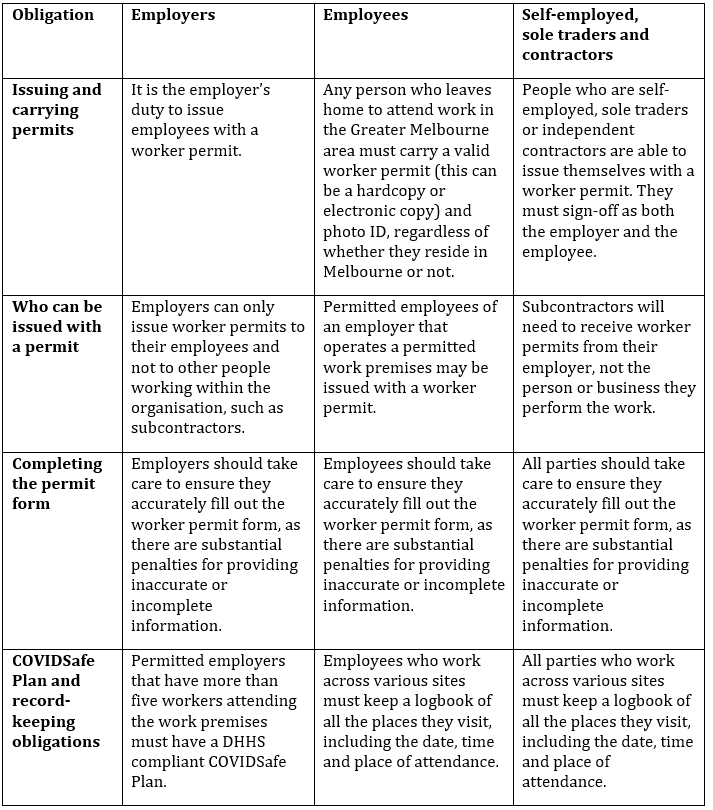14 August 2020
4 min read

The Victorian Government has recently announced a raft of changes to Victoria’s COVID-19 restriction levels. Employers now face the challenge of navigating the Victorian Government’s COVID-19 directions to ensure they remain compliant with the new directions and avoid exposure to substantial penalties.
Holding Redlich’s Workplace Relations & Safety team has put together a comprehensive guide to these changes to help employers tackle the ever-evolving COVID-19 landscape.
Snapshot
What is the Permitted Worker Scheme?
The Permitted Worker Scheme is the scheme of new business restrictions that apply within Greater Melbourne from 11:59pm on Wednesday, 5 August 2020. Workplaces must close down operations unless:
The Permitted Work Scheme does not apply to regional Victoria, which is currently under Stage 3 restrictions, meaning employees are required to work from home if they are able to do so. If employees from regional Victoria attend work in the Greater Melbourne area, they must comply with the requirements of the Permitted Worker Scheme.
What is a ‘permitted work premises’?
Unless an exception applies, only permitted work premises may operate on-site during the Stage 4 restriction period in Greater Melbourne. For a comprehensive list of permitted workplaces by industry, employers can consult the Department of Health and Human Services (DHHS) guide here. This page contains a Permitted Work Premises List, which is updated with changes approved by the Chief Health Officer.
Examples of permitted work premises include workplaces in the following industries (so long as all other directions are complied with): accommodation and food services, construction, education and training, financial and insurance services, manufacturing, rental hiring and real estate services, retail trade – goods (including supermarkets, bottle shops and motor vehicle parts for emergency repairs), retail trade – services (including locksmiths, laundries and dry cleaners) and wholesale trade (including grocery, animal feed and supplies and pharmaceutical wholesaling).
If you own, control or operate a non-permitted work premises in Melbourne, you must take reasonable steps to ensure that no one enters the work premises from 11:59pm, Wednesday, 5 August. Failing to comply may result in penalties of up to almost $20,000 for individuals and $100,000 for companies.
Who is a ‘permitted worker’?
A permitted worker is an employee of an employer that operates a permitted work premises. Employees can only work on-site as a permitted worker if it is not reasonably practicable for them to work from home and if they have a valid worker permit (or an exemption applies).
If your business is a permitted work premises and you are allowed to have workers attend the workplace, you must keep a record of who attends in accordance with the Chief Health Officer’s Workplace Directions.
Worker permits: Rules and obligations
If an employer is operating a permitted work premises, its employees cannot work from home and they are otherwise permitted workers, the employer will need to issue the relevant employees with a worker permit. The approved worker permit form can be accessed on the DHHS website here.
Employers and employees should take care to ensure they provide all required information and that it is accurate, as they may face substantial penalties for providing inaccurate or incomplete information. The obligations of employers, employees, self-employed, sole traders and contractors are set out in the table below.

The following people are exempt from the requirement to carry a worker permit:
Penalties
Employers face penalties of up to around $20,000 for individuals and $100,000 for companies who issue worker permits to ineligible employees, or who otherwise breach the Permitted Worker Scheme requirements.
There are also on-the-spot fines of up to $1,600 for individuals and $9,900 for companies who breach the Permitted Worker Scheme requirements. This includes employers and employees who do not carry their worker permit when travelling to and from work.
Providing false or misleading information attracts a penalty of up to $10,000 for individuals and $50,000 for companies.
Authors: Ben Holding, Ella Clements & Stefania Silvestro
Disclaimer
The information in this publication is of a general nature and is not intended to address the circumstances of any particular individual or entity. Although we endeavour to provide accurate and timely information, we do not guarantee that the information in this newsletter is accurate at the date it is received or that it will continue to be accurate in the future.